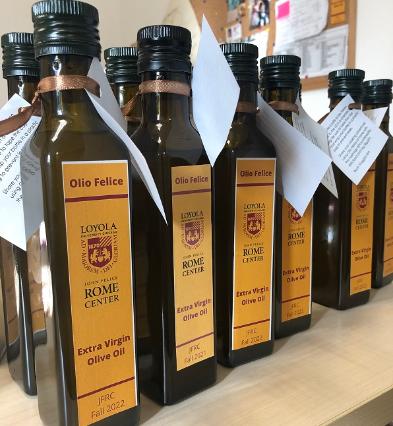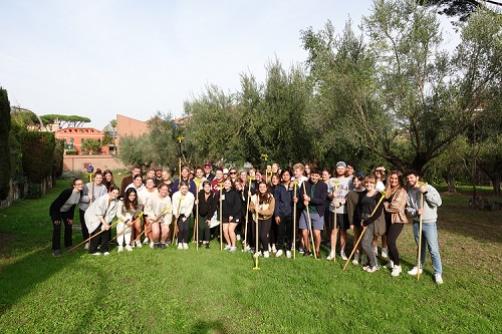Producing Italy's green gold

Olive oil is one of the pillars of Italy’s diet and many other countries around the Mediterranean. The benefits of a diet rich in extra virgin olive oil for our bodies and the planet are becoming increasingly more well-known. This “green gold” has been proven to reduce cardiovascular disease and improve cognitive functions. Choosing to consume extra virgin olive oil, as part of a plant-based diet, lowers our carbon footprint and is less taxing on our natural resources and thus inherently more sustainable.
And now at the JFRC – one of the very few, if not the only, American universities in Rome to house an olive grove – we have 50 liters of our own campus olive oil for students, faculty and staff to taste and consume.
On Friday, October 21, with the help of Barbara Lolli and the rest of the gardening staff, the JFRC community spent hours harvesting olives in the campus olive grove.
Most of the students present were from the Italian Culture: Food and Wine course, the Environmental Sustainability course, and the Scientific Basis of Environmental Issues course.
Students, faculty and staff harvested in the morning and then ate pizza and had an academic discussion about olives and olive oil, which was declared a UNESCO Cultural Heritage in 2010. Professor Rebecca Pawloski discussed theological facts about olives as well as the significance of the Mount of Olives in the Bible. Professors Elena Faramondi and Lorenza Fabretti, two Italian instructors, taught students about the geography of Italy, emphasizing the regions of Italy where olive cultivation is most prevalent. Professor Mario Carere discussed the risk of the use of pesticides for ecosystems and human health, while Professor Bruno Bellisario discussed the role of agricultural and cultural landscapes in urban development and their importance for biodiversity, emphasizing how a diversified mix of different habitats counteracts the effect of changing climate conditions.
By the end of the day, we had harvested 450 kilos or nearly 1,000 pounds of olives which yielded 50 liters or 13 gallons of olive oil or “Olio Felice,” as it is known around campus.
The olive harvest was last of a series of events in the campus-wide Olive Oil Week, sponsored by the JFRC’s Food and Sustainability Club. A local olive oil sommelier, Benedetta Bianchini, visited campus to guide a tasting of seven different extra virgin olive oils, including the oil produced at the JFRC in 2022. Students learned how to “cup” the oil in their hands, turning it back and forth to warm it, allowing the aromas to become more fragrant and then “strip” the olive oil, tasting it by like a professional by inhaling air over the oil.
The following day several members of the club led their own tasting outside of the cafeteria with one extra virgin olive oil from Liguria, another from Puglia and the oil from the JFRC 2021 harvest.
Another initiative of the Olive Oil Week Food and Sustainability Club member and library assistant also posted a list of book located in the JFRC Information Commons where students could do their own private research on olives and olive oil.
During the late fall, all over Italy, as families and farms harvest and press their olives, they start dining on grilled bruschetta with freshly-pressed bitter and pungent olive oil. And this year at the annual Thanksgiving dinner, the JFRC community held their own “bruschettata” when the olive oil was drizzled over warm bread and served as the appetizer for the Italian and American mash-up Thanksgiving dinner.

Bottles of Olio Felice are now located in cafeteria for the community to pour on their salads and bread, and students who participated in the harvest had the opportunity to bring a small bottle of oil home to their family and friends. Now more than ever, the JFRC community can reap the health benefits of Italy’s green gold from our very own olive grove.
The purpose of this event was to expose students the ideas of circular economies and allow them to experience traditional agriculture and farming methods in Italy. The annual olive harvest is part of a broader JFRC initiative for food systems and environmental sustainability education, in response to Pope Francis’ call to be stewards of creation and the United Nations’ Sustainable Development Goals.




